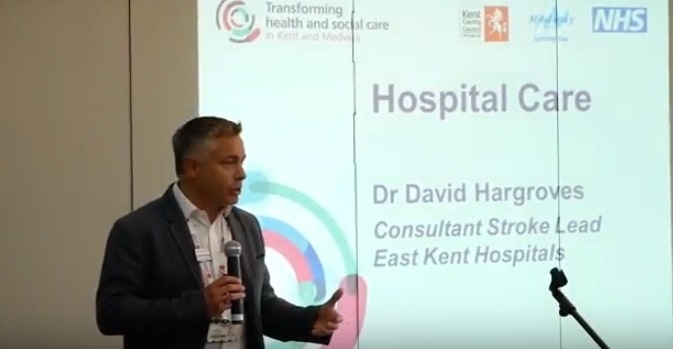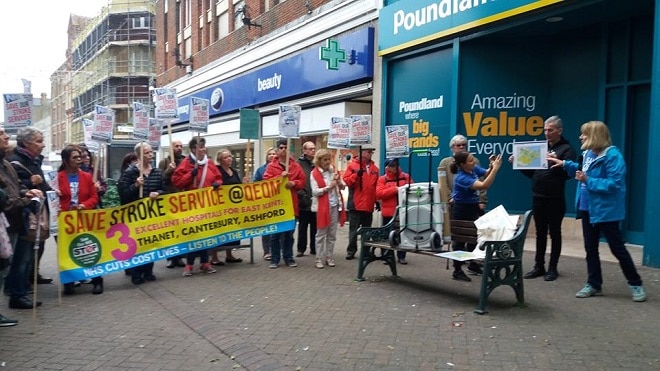
Stroke physicians at East Kent and Medway Trusts have hit back at claims from campaign group Save Our NHS in Kent that proposals for stroke services across the region will have “deadly consequences for people in Thanet and east Kent.”
In a statement issued today on behalf of four members of Trusts in Kent and Medway the claim is branded as ”inaccurate and irresponsible.”
SONiK is campaigning against plans to create three hyper-acute stroke units for Kent and Medway, meaning the closure of services at remaining hospitals.
The NHS in Kent and Medway – which includes all 8 Clinical Commissioning Groups – Bexley in south east London and the High Weald area of East Sussex drew up a shortlist of five options and has announced Darent Valley Hospital, Maidstone Hospital and William Harvey Hospital as preferred options for the specialist units.
General stroke services are provided in all the hospitals across Kent and Medway, including the QEQM, but there are currently no specialist hyper acute units. NHS bosses in the region say larger, specialist units in other parts of the country have been shown to improve outcomes for people who have had a stroke.
The decision means current services will likely be removed from some hospitals, including QEQM in Margate.
SONiK says studies on hyper-acute units carried out by the NHS were based on London where no patient had to travel more than 30 minutes to reach a unit. They say the one hour plus journey time to Ashford from Thanet could put lives at risk.
Statement
But in the statement issued today the Trust physicians and medical directors say: “The guiding principle of the clinicians who have led the Kent and Medway review of urgent stroke services is ‘First do no harm’. To state that doctors, nurses and therapists would develop and support plans that are a “dangerous experiment on the people of Kent” and will result in “less chance of surviving and…worse outcomes” is to call into question the dedication and expertise of those who want to do a better job for the patients they care for.
“The simple truth of the matter is that, as they currently stand, our stroke services do not consistently meet best practice standards across Kent and Medway, and our stroke teams are not always able to provide the first class care they want to deliver. This is something that as healthcare professionals we have a duty to address.
“There is a compelling body of national and international evidence to support the safety and benefits of our proposals for stroke services in Kent and Medway that we made public during the consultation earlier in the year and is available on our website. Any plans that compromised the safety of patients would not have been on the table, let alone the focus of public consultation.
“There has been extensive correspondence with Save Our NHS in Kent about this evidence which, despite the fact that it has been developed and endorsed by senior and experienced experts in stroke medicine, they refuse to recognise. Save Our NHS in Kent have repeatedly been offered a meeting to discuss the proposals, an offer they have yet to accept.
“While people are free to express their disappointment and voice their concerns, we believe that spreading fear and uncertainty hinders rather than helps the continuing public conversation that we are committed to having with local people about future plans for their health services.”
Signatories
The statement is from Dr Prasanna Aghoram, Consultant Physician in General and Geriatric Medicine – Special Interest in Stroke Medicine, Dartford and Gravesham NHS Trust
Dr David Hargroves, Consultant Stroke Physician, East Kent Hospitals University NHS Foundation Trust; Clinical Lead for Stroke, South East Clinical Network and Senate; senior clinical advisor on stroke medicine to national Getting It Right First Programme
Dr David Sulch, Interim Medical Director and Consultant Physician in Stroke and General (Internal) Medicine, Medway NHS Foundation Trust
Dr Peter Maskell, Medical Director, Maidstone and Tunbridge Wells NHS Trust.
Sonik response
From campaigners Dr Coral Jones, Carly Jeffrey, Helen Whitehead, Dr Tim Winch and Dr Paul J Hobday MB BS FRCGP DRCOG DFSRH DPM

Save Our NHS in Kent would like to respond to the statement by pointing out that ‘time is brain’; this is a maxim used by neurologists to refer to the rapid loss of brain cells when a stroke is left untreated.
Every minute in which a large vessel ischemic stroke is untreated, the average patient loses 1.9 million neurons, 13.8 billion synapses, and 12 km (7 miles) of axonal fibers. Each hour in which treatment fails to occur, the brain loses as many neurons as it does in almost 3.6 years of normal aging. Thanet’s 141,000 residents will be one hour away from crucial stroke care once these plans are implemented, with possible ambulance response times of 40 minutes for some patients. We are confident that our concerns are justified.
They say that their ‘guiding principle’ is ‘first do no harm’, and stress that the project is clinically led, but the fact is that the project in Kent is led by high-salaried managers with a business mindset, plus a few clinicians. The STP’s main duty is to drive through national reforms to scale back services so that far fewer hospitals in the country provide acute care (the treatment of sudden, urgent or emergency injury and illness that can lead to death or disability without rapid intervention).
It is the Kent & Medway STP’s role to ensure that these plans are rolled out in Kent. This is no secret, it is revealed in the STP’s own reports. Sadly, the duty to ‘do no harm’ is contradicted by the legal duty of the commissioning groups to eradicate their large financial deficits. Were NHS funding more in line with 1948-2010 levels, these deficits would not be as crippling as they are.
We stand by our assertion that it is an experiment on the people of Kent, as no other area in the country has such a high percentage of the population outside 45 mins journey time. We challenge the executives at the STP to disprove this. If they are unable to do so, it would be appropriate for them to retract the accusation that SONIK are behaving irresponsibly, halt the plans as they stand, and opt for a 4 HASU solution instead.
All of the studies being used to back up the stroke review plans are flawed in some way or not applicable to this area. We are working currently on a document that summarises the numerous ways in which we believe the NHS managers are using data inappropriately, in particular the claim that death and disability outcomes will improve – we say there is no such evidence. They are also aware that studies exist that prove there are disbenefits to moving acute care further away, but they have consistently chosen not to mention that. They have also ignored their own impact assessment that was carried out independently in December 2017; it shows that negative consequences are likely.
Protest
SONiK say they will continue to protest against the proposals and to fight for four HASUs in Kent and Medway, with one being at Margate’s QEQM.
Next steps
The next stage in the review process is to develop a decision-making business case – a detailed document that will describe how the preferred option was selected and set out an implementation plan that will cover areas such as workforce, estates and capital requirement.
A Joint Committee of the ten local NHS clinical commissioning groups that ran the consultation will examine this and then make a final decision on the future shape of urgent stroke services in January 2019.

